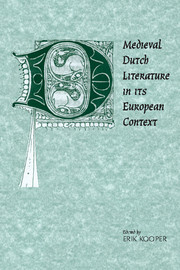Book contents
- Frontmatter
- Contents
- List of contributors
- Preface
- Map
- Introduction
- PART I COURT AND CITY
- 1 Court and city culture in the Low Countries from 1100 to 1530
- 2 Middle Dutch literature at court (with special reference to the court of Holland–Bavaria)
- 3 Heralds, knights and travelling
- 4 The rise of urban literature in the Low Countries
- PART II THE WORLD OF CHIVALRY
- PART III REYNARD THE FOX
- PART IV THE LITERATURE OF LOVE
- PART V RELIGIOUS LITERATURE
- PART VI ARTES TEXTS
- PART VII DRAMA
- Appendix A Bibliography of translations
- Appendix B Chronological table
- Index
1 - Court and city culture in the Low Countries from 1100 to 1530
Published online by Cambridge University Press: 13 October 2009
- Frontmatter
- Contents
- List of contributors
- Preface
- Map
- Introduction
- PART I COURT AND CITY
- 1 Court and city culture in the Low Countries from 1100 to 1530
- 2 Middle Dutch literature at court (with special reference to the court of Holland–Bavaria)
- 3 Heralds, knights and travelling
- 4 The rise of urban literature in the Low Countries
- PART II THE WORLD OF CHIVALRY
- PART III REYNARD THE FOX
- PART IV THE LITERATURE OF LOVE
- PART V RELIGIOUS LITERATURE
- PART VI ARTES TEXTS
- PART VII DRAMA
- Appendix A Bibliography of translations
- Appendix B Chronological table
- Index
Summary
The genres of chivalric romance and courtly lyrical poetry existed in Europe continuously from the twelfth-century troubadours onwards up to and including the sixteenth-century Italian humanists, thanks to the centuries-long patronage of an impressive list of rulers in France, England, Italy and elsewhere.
The Low Countries do not seem to have diverged much from this model. Among others, the courts of the Flemish Count Philip of Alsace in the twelfth century, the dukes of Brabant, Henry III and John I, in the thirteenth century, the count of Holland, Albert of Bavaria, at the end of the fourteenth century, and the Burgundian duke Philip the Good in the middle of the fifteenth century, were thriving centres for music, plastic arts and literature. It was not until the end of the fourteenth century that we find, in Brussels, the first bourgeois patrons. Only around 1300 do city-dwellers turn up in large numbers as readers of didactic treatises that were explicitly written for them. The complete breakthrough of bourgeois themes would only come about with the literature of the rhetoricians of the fifteenth century, which was produced for the well-to-do bourgeoisie.
For city-dwellers of the lower social classes there was a parallel development of popular culture from the fourteenth century onwards, based on the work of street poets and leading to the fifteenth-century Shrove Tuesday plays and the sixteenth-century chapbooks.
- Type
- Chapter
- Information
- Medieval Dutch Literature in its European Context , pp. 11 - 29Publisher: Cambridge University PressPrint publication year: 1994
- 5
- Cited by



